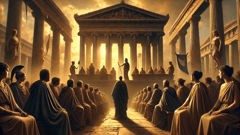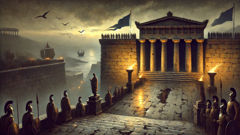Introduction
On a shoreline of wind-blown black stones, where the sea comes in like a speech and leaves its sharp punctuation across the coast, refugees of a war return to inherit the weight of what they have done. The House of Atreus does not receive its fortunes as gifts; it inherits them as curses, passed along in the grain of its timber and the mortar of its halls. In this telling, the great bronze of fate is warmed by human hands and cooled by human voices: no deus ex machina that descends with a scripted mercy, but gods who move like weather and people who reckon the cost. Agamemnon, a king whose name folded nations into his ledger, comes back to Mycenae with the thunder of war still under his boots and the cold of a sacrifice in his chest. Behind him, the haunt of Iphigenia’s unoffered life, the clairvoyant sorrow of Cassandra, and the sly, patient watchfulness of Clytemnestra wait like coiled threads. Each character in that house is both actor and instrument in a tragedy composed by history, hunger, and the small immediate laws of the hearth: honor, shame, and the demand that blood answer blood. The first part of the story opens with the red footprints of returning armies across the palace threshold and a chorus of city voices—neighbors, servants, old warriors—who cannot keep their tongues from naming what kings are owed and what the city costs. The second part narrows to the secret rites of revenge in quiet rooms, the stolen oaths and the soft creak of a door. The final part unhooks the story from its private bedrooms and drags it into the lighted forum when Orestes stands judged, not only for a murder but for the form that justice itself will take henceforth. Here, then, is a human rendering of the Oresteia: rendered in the smoke of the hearth, in the crackle of accusations, and in the long lingering of consequences. I ask you to listen to these voices—rough, reluctant, and sometimes unkind—because the old story is not only about fated gods; it is the slow invention of law, the struggle to move from an eye for an eye to an order where speech and proof outweigh the private blade.
I. The Return and the Red Threshold
When the army came home, it smelled of the sea and of iron, and Mycenae gathered like a wound to see it heal—or to watch how it would fester. The city had honored the war with songs and bone offerings, and yet those same songs now settled into a dull, uneasy hum, as if music itself had been taught how to hold its breath. Agamemnon returned, great in stature and heavy with victory, his name sounding in the mouths of old comrades and new petitioners alike. He carried prizes, captives whose eyes had the strange blankness of people amputated of choice. Among them was Cassandra, whose voice had been given the cruel clarity of foresight and the curse that no one would believe her. She spoke the future like an open wound and was dismissed as mad: a prophet whose language was unbearable. She warned them not to trust the quiet halls of home, and yet the palace accepted her into its rooms like a mirror they avoided looking in.

Clytemnestra moved in the palace with a precision that looked like calm but was a different kind of violence. People called her proud once, a queen who could hold flame in a single hand and not let it burn her. Under that skill lay a slow, deliberate grief that hardened into a certain jurisprudence: where men made laws by spear and command, Clytemnestra learned to count the costs of what those laws asked. Iphigenia's name was a small dry stone lodged in every mouth—forced ashore for the altar, given up, the king's hands steady when the knife came down. The memory of that sacrifice had the quality of a small, persistent light: it altered how things looked, just as a candle changes the face of a room by sitting in it. The chorus of servants and elders murmured: she had been given for glory and the gods had wanted it. But Clytemnestra asked the harder question: did the gods order such a thing, or did a father's hunger for honor wear the gods like a badge? Where the chorus named ritual and fate, Clytemnestra named calculation and owed payment.
The house, in those days, wore two kinds of weather—public noise and private calculations. The heralds declared festivals to welcome the king as if closure could be bought with a procession and the clanging of bronze. But within the inner rooms, the household kept a ledger of injuries. Agamemnon's triumph was a tapestry threaded with the fresh white of sacrifice and the dark stitch of blood. He stepped across thresholds that carried the tip of a knife in their memory. Cassandra, unable to alter her fate by voice, sang of deaths as though they were loose stones rolling: "He will enter and not know his path will split his house." Her singing cut like a file because it was true, and the palace treated her words as small insects buzzing around the bread.
When Clytemnestra plotted, she did it not as a sudden eruption but as the slow gathering of weather before a storm: calling allies close, testing the loyalty of servants, and watching Agamemnon as one watches a man asleep who has not yet adjusted to his bed. Aegisthus, a shadowed figure with old grievances against Atreus’s kin, moved like a tide behind her, present and useful, but it was the queen's hand that drew the knife. The murder itself, when it came, was not a chorus of screams and open spectacle but a sequence of domestic acts—door unlocked at the right time, bath prepared, a rug pulled back. The palace's great hall, the place where kings once taught younger men how to measure spoils, became an altar of a different kind. Blood touched marble; the silver designed to gleam for feasts drank red. Outside the city, the rumor spread like smoke: a king stripped of breath by those within his own house. Many asked whether justice had been balanced, or whether a new kind of law—the law of private vengeance—had simply replaced old pretenses of divine will.
The chorus of Mycenae, whose voice in Athens is often a moral mirror, here served as the city's conscience and its gossip. They moved between scenes with questions: must blood be answered with blood? Is murder ever noble if it answers an earlier evil? They told tales of kings and fortunes, of the threaded debts that demand repayment. For common people watching, the drama had a practical sting: if every wrong demanded its precise price in blood, then peace would always be a pause between wounds. Some in the city called Clytemnestra a liberator, avenging her child with a mother's claim; others called her a usurper, a woman who had pierced the natural order by killing a husband. That split is the first crack in the house's foundation: public speech carving a groove divergent from private resolve.
In these scenes, gods play at the edges. Apollo's counsel, when it appears, is like a physician’s ambiguous prescription: «Drive out the stain, and you will answer a new stain.» Fate's voice is not an external sledge, but a whisper carried in human ears—half prophecy, half human interpretation. The interplay of divine omen and human choice becomes a pattern: decisions made with god-words borrowed after the fact to sanctify what the heart already wanted. Cassandra's true horror was not the knowledge of what would happen, but the way those around her clasped their hands and called the events by divine names, thereby making them inevitable. No one asked whether a father might be judged for sacrificing a child in the name of glory; they only noted that the gods would be pleased. That slipperiness—the tendency to fold private deeds into divine will—is the moral engine that spins the rest of the tragedy.
Yet the palace does not end with Agamemnon. The murder expands the plot like spilled dye, staining more than the floor. The next movement unfurls in narrow rooms and by dark hearths where pacts are whispered and children learn how to weigh honor against survival. Orestes and Electra become people shaped by absence: siblings who measure time by the hollow where a father once stood. The memory of the returned king becomes the axis around which the next crime turns. For some, murder is an act of rightful reprisal; for others, it is an unending convulsion that will breed more convulsions. The chorus keeps asking: what is justice among kin? When will the cycle end? The answer, the chorus suspects, will not come in a single blade but in the slow, hard invention of a public space where accusations can be weighed and resolved apart from the private blade. For now, blood answers blood and grief spawns the next demand.
II. The Avenger and the Tribunal
If the first part of this tale is a thunderclap that reveals the rot beneath a city's pride, the second is a drawn bow—coiled, deliberate, designed for the single releasing stroke that will determine the direction of the coming days. Orestes, reared in exile and rumor, grows into a man with a twofold inheritance: the names of his dead and a demand that echoes in the space where those names used to live. Electra, narrower in battlefield and yet broader in sorrow, keeps the records of grief like a ledger, counting the ways memory can be pressed into action. Their father’s death becomes a template: an injury that has to be made even. The oracle, the ambiguous envoy of a god who often speaks half-truths, urges Orestes forward, and under Apollo's counsel he returns with a companion and a plan. The audience, whether within the palace walls or beyond, watches to see whether justice will be done in private or whether some higher order will be invented amid blood and accusation.

To be an avenger in this world is to step into a history that has already written the motive for you. Orestes carries the heavy name, and every footstep toward home is measured against the memory of Iphigenia's dying whiteness, against Cassandra's screams, against the stain on the marble where a king's head once lay. Electra is the patient flame; she feeds the fire with memory and uses the old rituals as tools. They speak in hushed tones at midnight: how to slip past guards, how to time a reentry into halls where not all faces will welcome them. The scarred men who once fought under Agamemnon have other loyalties now, and the city divides between those who think private vengeance rightful and those who fear its spiral. In the low rooms and the open courts, speech becomes a weapon; accusations are sharpened and prepared; deeds are awaited like lightning.
The act itself—Orestes’ return and the killing of Clytemnestra—comes not as a single heroic tableau but as a series of small, intolerable confrontations. The scene is intimate and terrible: a son confronting the mother who killed his father, a woman preparing for her own defense by invoking the ancient entitlements of queenship and survival. She argues that killing a husband in his own bed is not the same as the abominable giving of a child to an altar, and her words are not mere self-justification but a counter-history: she names grievances and calls them reason. Orestes, on the other hand, acts under the sanction of a god and the demand of filial duty. When the blade falls, the moment is not clean; the house shudders under the weight of voices—servants shrieking, servants paralyzed with fear, and the immediate, raw moral question: was this justice or the multiplication of more crimes?
The Furies—ancient, dogged, and unappeasable—take their place in the story like storm-clouds that follow a struck flint. They are not merely mythic entities but the personified pressure of a community conscience that refuses to let a murder be hidden. Pursuing Orestes with the stubbornness of a bad conscience, they make of his mind a battlefield. He is haunted not only by the images of blood but by a metaphysical accusation that echoes in the private rooms of his soul. For the Athenians who will later hear the story, the Furies represent the old order: a system of vendetta and retributive justice where social order depends on the deterrent of terror. Their pursuit of Orestes forces an invention: if a society is to survive beyond the immediate revenge, it needs an institution that can adjudicate guilt and assign punishment without a private blade.
Thus the third movement of this drama shifts like tectonic plates—what has been private and violent becomes public and deliberated. Athens, or at least the idea of it in this telling, convenes a tribunal: a court of citizens. The trial of Orestes is not simply a legal proceeding; it is a civic reimagining. The old Furies, embodiments of ancestral law, challenge Apollo's youthful pronouncements. Apollo argues that the god sanctioned the act—he who knows the god’s will insists that Orestes answered a divine imperative. The Furies argue on behalf of blood, lineage, and memory: crimes against kin are the worst because they tear the web that holds a community to itself. Citizens—jurors plucked from a city that is already trying to imagine itself as governed by debate rather than by private weapons—are asked to weigh these claims. The rhetoric is electric. Orestes' advocates speak of necessity and the need to clear polluting deeds from the house; Orestes' detractors speak of the sanctity of kin bonds and the danger of allowing even gods to authorize the shedding of familial blood. Athena, who presides in this storytelling twist, declines to simply decree an answer. Instead she proposes a vote and the creation of a new order: if citizens accept the law of reasoned judgment, then some forms of ancient retribution may be retired. The trial becomes less about a man’s single guilt and more about what kind of city the people want to be.
The jury's verdict is close: the vote is split, and the deciding voice is rational rather than visceral. The Furies are given a new shelter—transformed from avengers into guardians of civic order, their rage redirected into institutions that will watch for moral contamination without reverting to murdering private justice. They are given honor, altars, and a role within a new legal framework. Orestes is acquitted because the city accepts a different logic: that law and citizenship can replace the endless arithmetic of private revenge. That transformation is not painless. The Furies do not vanish; they remain, now domesticated, still dangerous and necessary. They preside over the conscience of polis, ensuring no slide into lawlessness. The narrative's moral is not a simple condemnation of revenge nor an outright celebration of law; it is the far more interesting observation that human communities have to invent structures to replace the immediate satisfaction of revenge. Without such forms, private justice will always be the default.
In the aftermath, we see what such an invention costs and what it saves. Orestes, spared from eternal torment, must live with the images of his acts. Electra, who fed the initial flame, finds a different shape for her life as the house rearranges itself under the new civic order. The transformed Furies, honored yet watchful, become the memory and instrument of restraint: an institutional conscience that remembers old grievances but channels them into ritual and law. The audience—the citizens of Mycenae and the polis beyond—are left to reckon with what it means to shift from blood to law, from private blade to public judgment. The tale does not insist that the change is flawless, only that it is necessary if a city is to survive the multiplying arithmetic of grievance. Heroes and villains blur; gods and mortals intermingle. The final lesson is about process: how a community invents ways of adjudicating that can hold fragile peace together even when history’s old thirst for blood continues to lap at its borders.
Conclusion
The House of Atreus, in its long, terrible inheritance, teaches a final lesson: that destiny, while it can be named by gods and excused by invocation, is also crafted by human laws and human will. The Oresteia’s arc bends from private vengeance to public adjudication—a transformation not of morality alone but of political imagination. Justice, in this telling, ceases to be the single satisfaction of a wrong and becomes a shared mechanism, a structure that permits a community to declare guilt, to weigh testimony, and to decide collectively how to repair harm. The Furies, once the personified fury of private retribution, are not annihilated but integrated; their force is harnessed to guard against the very slide into personal vendetta that once defined the house. Orestes is spared the endless flight of a guilty life, not because his act was sanitized, but because the polis agreed to hold its breath and count, rather than to stab and be stabbed. The final scene is not a neat resolution; it is a city with new instruments and old wounds. The tale leaves us with an uneasy gratitude: gratitude that institutions can take the pressure off private vengeance, unease because those institutions are fragile and born of contested choices. In the quiet aftermath, the characters—kingless houses, servants returning to daily tasks, children born after the storm—learn that the most ordinary things require the most careful protection: speech that can be heard as evidence rather than weapon, rituals that remember without endorsing endless revenge, and a civic courage to face the past without reenacting it. The Oresteia remains, then, a story about the labor of civilization: how people learn to trade the immediate comfort of retaliation for the slow, cooperative work of weighing, judging, restraining, and making peace seem like something more than a lull between blows.













